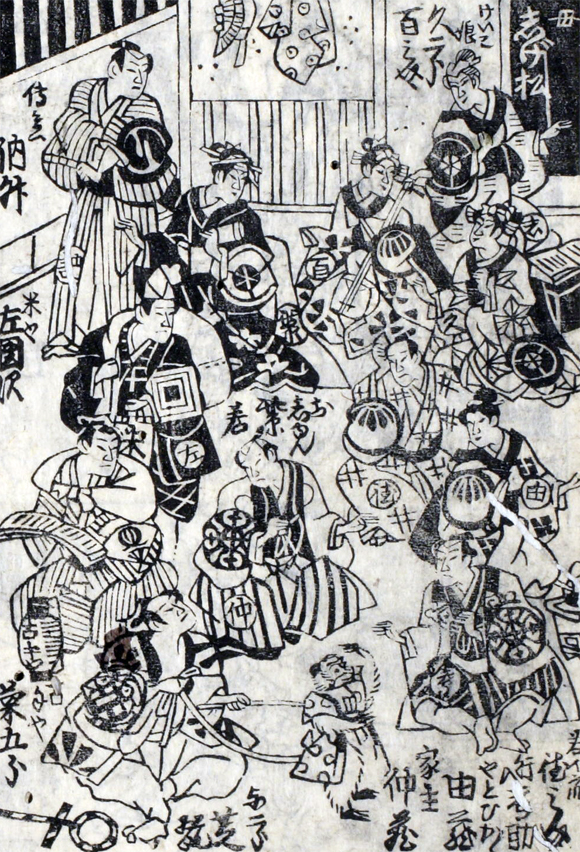| HORIKAWA |
| Play title | Chikagoro Kawara no Tatehiki |
| Common titles | Horikawa Oshun Denbŕ |
| Authors | Nagawa Shimesuke I, Tsutsui Hanji, Nagawa S˘suke |
| History |
The play "Chikagoro Kawara no Tatehiki" was originally written for the puppet theater (Bunraku) by an unknown playwright and staged for the first time in the 1st lunar month of 1782 in Edo at the Gekiza. It was based on a real event that happened in Ky˘to the 5th day of the 4th lunar month of 1703: the double suicide along the Kamogawa River of the rice merchant Denbŕ and the girl Oshun from Horikawa. "Chikagoro Kawara no Tatehiki" was adapted for Kabuki in the 4th lunar month of 1807 by Nagawa Shimesuke I, Tsutsui Hanji and Nagawa S˘suke. It was produced by Nakamura Kumetar˘ I in ďsaka at the Horie no Shibai (casting unknown). The same thema, the love suicide of Oshun and Denbŕ, was recycled by Chikamatsu Tokus˘ in the drama "Sarumawashi Kadode no Hitofushi", which was premiered in the 7th lunar month of 1798 at the Kado no Shibai [more details]. It had a happy-ending (no shinjű at the end). |
| Structure |
The original puppet play was in 3 acts. The "Horikawa" act, the only surviving one, is the second one. |
| Key words |
Gidayű Ky˘gen Horikawa Oshun-denbŕmono Saruhiki Sarumawashi Sewamono Shinjű Shinjűmono |
| Summary |
Though Horikawa lies in a capital city, it might as well be a rustic place. Oshun, an ex-prostitute, was born here. Now her brother and mother are leading indigent lives. The brother manipulates monkeys, while the mother teaches ditties to neighboring lasses, for little money. Oshun has been living with them since she was discharged by her master. In fact, he feared lest his shop should be involved in trouble caused by Denbŕ, Oshun's lover, who killed a man. On a winter evening, Yojir˘ returns home from his work. Today too, his earnings are very small, but honest. Yojir˘ tries to behave merrily lest his mother worry about her daughter, Oshun. Both Yojir˘ and Ogin feel uneasy when they think about Denbŕ stealing into their house to see Oshun. They know that the young couple has decided to die together. Therefore, Yojir˘ and Ogin tell Oshun not to meet with Denbŕ even if he comes. They implore her to write a farewell letter to him instead. Oshun cannot help obeying their request. She writes a letter. But her mother and brother don't know what is written in it, because the mother is blind and the brother is illiterate. Night falls, and Denbŕ comes stealthily. He calls Oshun in a small voice. Of course he wants to die with her. Oshun instantly becomes aware of him. She opens the door quietly. Yojir˘ notices it. He is so horrified, that he mistakes Denbŕ for Oshun. As a result he lets Denbŕ come in and Oshun get out. He shuts the door and locks it. Because of this clamor Ogin wakes up. She also confuses Denbŕ with Oshun. Finally the mother and son become aware of their mistake. Yojir˘ recovers his senses in no time flat and thrusts towards Denbŕ the letter Oshun has written. At first Denbŕ rages against Oshun's fickleness, but as he reads it the content reveals itself. It says that Oshun's heart will not change whatever may happen and that she wants to die with Denbŕ to whom she has given her whole life. Looking at Ogin's grief and Yojir˘'s shock, Denbŕ reads their thoughts. He can do nothing but to bid farewell to the family and ask them to arrange for his funeral after he dies alone. Oshun bursts into tears. She tries to kill herself by cutting her own throat with the razor she secretly carries with her, but is prevented from doing so by Yojir˘. Her mother knows her daughter's true heart for the first time. She apologizes to Denbŕ for forgetting justice and humanity because of her blind love for Oshun. In tears she allows them to marry and asks them to live as long as possible. Yojir˘ also agrees with Ogin and suggests that they flee from there, hand in hand. Being struck with emotion, Denbŕ and Oshun make up their minds to run away. Wishing the young couple good luck on their departure, Yojir˘ shows an auspicious dance performed by his two monkeys, which are compared to the young couple who are going to their honeymoon and death. This summary has been written by Watanabe Hisao and edited by Jeff Blair [website] |
| Trivia |
The Meiji star Onoe Kikugor˘ V had the idea once to use a real monkey on stage when he played the role of Yojir˘. The highlight of the performance was something not expected by the actor: the monkey peeing on the stage ... to the audience's delight. |
 |
|
Illustration from a ehon banzuke for the staging of the drama "Chikagoro Kawara no Tatehiki" in the 10th lunar month of 1870 at the Moritaza with the actors Sawamura Tossh˘ II, Iwai Shijaku II and Nakamura Shikan IV in the roles of Izutsuya Denbŕ, Oshun and Yojir˘ |
|
|
| Contact | Main | Top | Updates | Actors | Plays | Playwrights | Programs | Links | FAQ | Glossary | Chronology | Illustrations | Prints | Characters | Derivatives | Theaters | Coming soon | News |